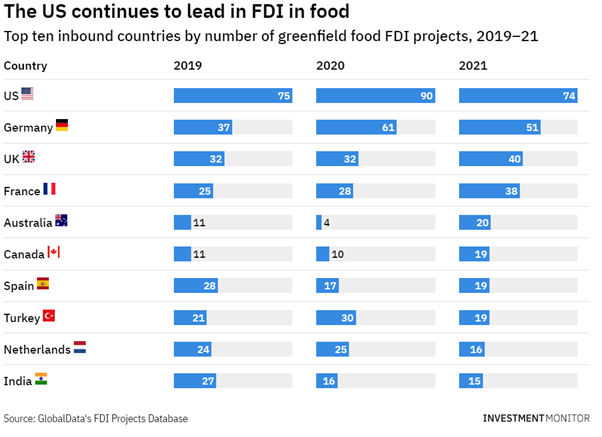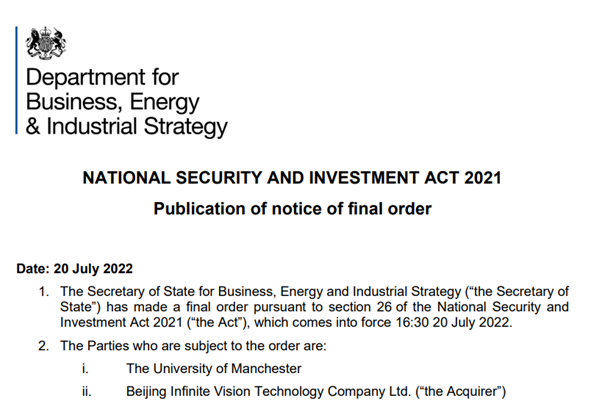1. UK blocks Chinese company from licensing Manchester Uni tech
The UK’s National Security and Investment (NSI) Act came into force in January of this year and has since blocked FDI not only to do with transactions but licensing, as in the case of a robotics technology developed by Manchester University and attempted licensing by Beijing Infinite Vision Technology. Business minister Kwasi Karteng issued a final order on the attempt by the Chinese company to license the sensing technology called SCAMP 5 and SCAMP 7 citing security risks. This was the first case of a blocking and did not apply to a transaction but licensing so the legislation has further reaching scope than one might think at first sight. It blocked the licensing stating that the technology could be used in defence applications although the Beijing company said it was to be used for children’s toys.
The Act deems transactions in 17 sectors as sensitive.
The UK is only one country in a host of other nations to implement such legislation in the wake of COVID to block predatory investments by foreign companies on grounds of national security. For example, the US and Europe have each implemented similar legislation, along with other countries.
Trade Horizons
Trade Horizons is an award-winning market entry company, assisting ambitious companies to identify, develop and grow sustainable revenues in new geographic markets. We offer support to clients in international strategy development for their global business growth, and throughout the key phases of market entry execution – Preparation, Launch and Growth. Click here to find out more.
2. Food FDI down

Only 534 projects received FDI in the food sector in 2021 down on 616 in 2020 and 701 in 2019.
According to Investment Monitor, West Europe leads taking 37% of investment and is stable as the number of investments in this region did not decrease. North America region grew investments from 83 to 93 projects including the largest project by Nestle in Virginia. All other regions were down especially Asia-Pacific.
3. Roundtripping in India: restrictions on outbound FDI

As detailed above many nations have implemented protectionists screening and control mechanisms and legislation on foreign direct investment since the COVID pandemic.
India is one country that has restricted outgoing investment of its citizens into foreign activities in such areas as real estate, gambling and some fintech, the rules being that an Indian resident cannot invest in a foreign company that invests in an Indian entity, called round-tripping.
The aim is somewhat unclear but seems to do with cryptocurrencies and crypto trading which has already been impacted, the regulation limiting incorporation of foreign holding companies which are a foundation of crypto assets trading.
4. Brazil FDI up

Brazil was the fourth largest recipient globally for global FDI in 2019 but has dropped to 11th place. It is the second largest Western economy to the US with 210 million inhabitants which could explain its attractiveness, and ninth largest globally.
Brazil’s fortunes changed in 2011 from being one of the most invested in countries to dropping down the tables due to recession until 2017.
FDI inflows in Brazil increased from USD 65 billion in 2019 to USD 25 billion in 2020.
Brazil has just published a press release announcing the largest FDI from January to May in 2022 since 2011 of US$39.71bn.
Interestingly, although the number of projects dropped in 2021 from 2020 to 184 from 222, the inflow increased by around US$12bn as it saw higher value investments mostly in oil & gas.
Netherlands is the largest foreign investor followed by the US.
5. Employment in US vs. UK

The biggest difference between hiring someone in the US vs the UK is quite simply that you can fire them whenever you want. ‘At will’ clause is such that an employer does not even have to give a reason for termination. Caveats preventing prejudicial decisions for example based on pregnancy and so forth still exist in US employment law however outside of those the employee has relatively little protection.
In the UK, employment law is governed by contracts which uphold rights and responsibilities of the employer and employee. An employer is not permitted to terminate an employee’s contract for any reason without notice. There are specific termination clauses employers are bound to in English law such as showing cause and giving notice.
In the US, employment law differs from state to state. For the most part, countries in the United Kingdom operate under much the same rules except for Northern Ireland which has different rules as Scotland, England and Wales law is derived from Westminster but Northern Ireland has been governed under the Northern Ireland Assembly since 1988.
Another fundamental difference are the statutory minimum holiday requirements: in the UK a full time employee has a right to 28 days paid leave whereas in the US there is no minimum requirement. Additionally sick pay in the UK can be anything up to 28 weeks whereas there is no US national law on paid sick leave for any amount of time, but this differs by state.
Overall there are many differences in employment law between the US and the UK, and US laws often differ by state.
6. Certification internationalisation

The Government has launched a scheme to award regulators £750,000 to internationalise their certifications and qualifications. The Recognition Arrangements Grants Programme funds professional bodies to get recognition of their qualifications or certifications from other international organisations.
7. Innovate Alabama awards grants to 30 SMEs

The Supplemental Grant Program launched this July under state organisation Innovate Alabama and has since allocated $4.5m in funding to 30 SMEs.
Alabama’s Governor Kay Ivey announced the grant program this July with the goal of enticing progressive Alabama companies to stay in the state and contribute to the developing business economy.
Small business can apply for up to $250,000 in funding.
Innovate Alabama was formed after the old Alabama Innovation Commission was sunset in December 2021 with the remit of implementing “forward-thinking policies that will create a more resilient, inclusive and robust economy to remain competitive in a 21st century world… It is Alabama’s first statewide public-private partnership focused on entrepreneurship, technology and innovation.”







